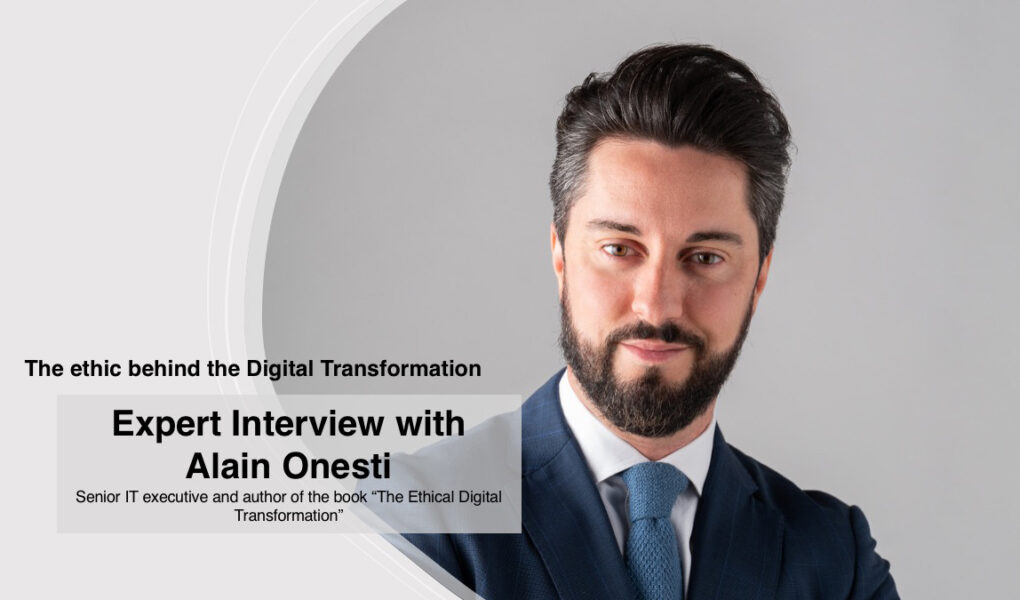Alain Onesti, Digital Innovation Manager at a global recruitment company and expert in digital transformation, Author of the Book “The Ethical Digital Transformation,” examines at what it takes to be truly ethical in a digital transformation project.
Many organizations have increased their attention on digital transformation as a result of the epidemic, and we are seeing a seven-year surge in the rate at which these initiatives are being implemented internationally. Many businesses have undertaken substantial digital transformation projects in recent months to stay competitive, with digital firmly in the spotlight.
Organizations must embrace Digital Transformation in order to fulfil escalating customer expectations, create scalable, personalized experiences, and respond to market dynamics with ever-increasing business agility. When paired with efficient operating models, digital services and disruptive technologies like cloud computing, robots, AI, and big data enable organizations to drive innovation and adjust to internal and external events better and more cost efficiently than ever now.
Need for Ethics
Ethics is the practice of making a principled decision between right and wrong; it is concerned with how people should act rather than how they now act. And, while the topic has previously struggled to acquire traction among corporate leaders, things are, happily, considerably different now. Many corporations regard ethics as not only crucial, but also as a key differentiator in a highly competitive market where reputation and values are as important as products and services.
While all firms with a digital transformation goal should incorporate ethics, the most challenging task will be at the individual level – corporations do not make decisions; individuals do.
From an ethical perspective, digital professionals at all levels will need to figure out what the ‘correct’ thing to do is. Whatever level of ethical awareness or ethics training an organization may or may not have, what is considered ethical might differ between individuals, groups, religions, and cultures, and in a global and fast-moving digital society, this leaves a lot of opportunity for interpretation.
Even when the appropriate course of action is evident, competitive pressures in the real world can lead to individuals making decisions that are damaging to others. Having the talents and moral daring to question established standards and act ethically is part of being ethical.
So, in a digital society, what does it mean to be ethical, and how can people involved in the design, development, and deployment of digital services translate ethical notions into professional behaviors that will assist digital transformation initiatives?
Business Ethics in the Digital World
When businesses engage in ways that others consider immoral, they are more likely to receive negative local, national, and even international media attention. Organizational behaviors that promote trust and exhibit integrity will be just as crucial as the technological difficulties they confront, such as application integration, cybersecurity, and data governance, if they are to achieve digital success.
Onesti says in his book that Digital efforts have the ability to provide long-term benefits and boost the value of an organization, but these benefits must be balanced against the challenges posed by eroding trust, which is driven by dissatisfaction with how some organizations are utilizing digital technology.
Confidentiality and data security concerns persist; not only do data breaches occur at alarming rates, but organizations have been hesitant to notify people affected when they do. Concerns about accountability are also growing louder, since established systems may no longer be effective, or worse, may be corrupted, as AI and machine learning algorithms become more capable of making autonomous judgments.
Digital Transformation Ethical Principles
What becomes clear is that confidence in the digital economy can only be established if digital experts are prepared to make ethical choices despite continuing to work in highly competitive markets where the wish to deploy online services as quickly as possible frequently took priority over the need to consider ethical implications.
For Digital Transformation, there are five ethical principles to follow:
Make Privacy, Security, and Integrity a Top Priority in Your System
While there are likely to be huge potential to develop new and lucrative insights from big data, there are also likely to be significant hazards from perceived unethical behavior, whether intentional or unintentional. How data is gathered, kept, and used is not only a technical but also an ethical issue.
In the digital age, integrity and ethics must be the guiding standards for professional activity. Data must be used responsibly and ethically by businesses, which means not in ways that are intrusive, manipulative, or insulting to others.
Transparency requires organizations to disclose their objectives for data usage and to allow customers to offer consent. Customers are frequently chastised for the quantity of data they collect and monetize. The gap or lack of openness around the value exchange between customers and service providers is part of the problem. Any financial gain obtained from the collecting of personal information must be handled by both parties.
The concept of ‘Explicit Consent,’ which refers to permission given with full knowledge of the foreseeable consequences, is a crucial ethical precept. Because little is understood about the data’s intended use at the time of collection, this is a significant difficulty for businesses gathering data, especially personal data for analytics. In fact, gaining informed consent may be impossible or prohibitively expensive due to the scope of the task; still, the idea should be followed as much as
feasible during the design and development of digital services. Even then, informed consent will be a point of contention, as companies would have to assess the legitimacy and scope of consent given if agreements are required to use digital services.
Considerations have already been brought up about smartphone device’s ability to track people’s freedoms even though the phone’s location services function is turned off, and findings that face recognition apps are being used in some nations have a darkened purpose in sight: to collect this information for purposes that are unlikely to be genuine.
Encourage Believe One Another
Individuals, groups, and organizations who utilize data must have confidence in the digital services and data they use. Those who gather and process information must operate on the assumption that the data’s integrity must be ensured in order for it to be relevant to consumers.
Trying to assure data integrity requires organizations to ensure that the data they store is subject to stringent governance and auditing mechanisms. Simply put, businesses must be aware that what was previously placed there has not altered.
In addition to storing data, digital infrastructures allow it to be made accessible to someone else for a variety of uses, including verification, duplication, and analysis. If digital customers are to have faith in the underlying data that powers the services they use, it must have a clear origin, end- to-end transparency from source to user interface, and be of adequate quality to serve its intended purpose. If the data’s source and validity cannot be checked, it poses a major danger to those who consume it; once the data is processed, any actions taken as a result cannot be reversed.
Organizations that rush to produce “the art of the possible” without understanding the essential principles of privacy, security, and integrity are putting themselves at a high risk of ethical blunder.
Ascertain that There is Responsibility
Inference models and algorithms are critical components of the growing number of ‘smart’ digital services that offer artificial intelligence and machine learning. Concerns have grown concerning the extent to which clear responsibility systems can be maintained as a result of their ability to merge social data with judgement engines.
If financial services organizations, for example, use algorithms to make choices that would typically be made by trained and authorized professionals, questions about responsibility must be raised. As a result, companies developing digital services must guarantee that they are not utilized to avoid or decrease corporate responsibility.
Encourage a Moral Mindset
The set of shared values, beliefs, and norms that impact the way people think, feel, and behave inside an organization is known as organizational culture. Values are crucial because they express what the company stands for, such as “Offering an Outstanding Digital Experience” or “excellence through innovation and teamwork.” While a list of company values can be found on most company websites, posting a list of principles is not the same as embracing them.
Organizations that are value-driven actively display their values and utilize them to guide their decisions, even if it means making difficult decisions.
While digital transformation has the capability to give opportunity, value, and success at all levels of the organization, it must be done in a fair, honest, and transparent manner. As a result, digital businesses have a moral responsibility to protect their employees from taking unwarranted risks that could be harmful to both the individual and the company. Let’s not forget that an individual’s professional reputation is just as vital as an organization’s.
Be Cautious of Prejudice
Unintentional ethical behaviour can be induced by a variety of factors, but one of the most common causes is sub-conscious biases that impact human behaviour. The most well-known example is confirmation prejudice, in which people seek or interpret knowledge in a manner that confirms their ideas, hypotheses, or expectations while dismissing opposing views and information.
In his book, Onesti brings about ‘Cherry-picking’ data to promote digital transformation business applications or drive digital service testing, for example, is likely to raise ethical concerns among people who want such activities to be carried out with a high degree of reliability and impartiality.
When data is affected, there’s a good chance that systems that use it will be distorted as well. Machine learning algorithms, which are used to make millions of decisions every day, must be of great importance. Algorithmic prejudice has already been warned about, with experts claiming that it is now ubiquitous in many businesses, with little action made to uncover or correct it. This is a concerning concept, given that machine learning is increasingly being used in a variety of industries, including medical, banking, and law.
‘Transparency,’ of course, is the answer to the question of prejudice. As they design, assure, and implement digital services, digital experts will need to challenge current establishment behavior and actively discover latent biases. Customers buying technologies that use AI and machine learning algorithms must understand how the inference models were constructed and the data that drove them in order to build and sustain consumer trust.
Conclusion
In the digital economy, a successful firm will be one that not only recognizes ethical concepts such as trust, integrity, justice, confidentiality, and transparency, but also actively employs these to do the right stuff and make decisions far above reproach.
Onesti concludes by saying that Ethics must no longer be looked of as only a marketing tool with little actual impact on the culture of digital organizations, but rather than as a set of essential behaviors that everyone involved in digital transformation should exhibit. If there’s ever been a time when ethical rules for digital transformation were needed, it’s now.
Check out the book on Amazon.




